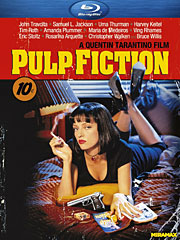- Rated R
- Drama
- 1994
- Buy the Blu-ray
All photos © Miramax
Reviewed by David Medsker
()
uentin Tarantino's seminal "Pulp Fiction" has become such an integral part of the mainstream culture that it's easy to take the movie for granted. Indeed, some will blame "Pulp Fiction" for being the film that launched a thousand shitty indie movies. ("2 Days in the Valley," stand up. Now, walk slowly out of the room.) What people should remember is that "Pulp Fiction," lousy knockoffs aside, forever changed what we should expect from a movie, in terms of its dialogue, characters and story structure. Its influence is apparent in movies as far-ranging as "Grosse Pointe Blank," "Go" and "Memento." While moviemaking of late appears to have sunk to pre-"Pulp" levels of uninspired mediocrity, make no mistake: the ripple effect of "Pulp Fiction" will be felt for decades to come. Centuries, if we're lucky.
The multiple-act, non-sequential story begins in a diner, with a daft couple (Tim Roth and Amanda Plummer) going from sweet talk to mass robbery in the blink of an eye. Then we meet two hired guns, scripture-quoting Jules (a never better Samuel L. Jackson) and dopey heroin user Vincent (John Travolta), retrieving a suitcase that belongs to their boss, crime lord Marcellus Wallace (Ving Rhames, and if you still don't know what's in the suitcase, write me, now). Vincent later takes Marcellus' wife Mia (Uma Thurman) out for a night on the town, where she proceeds to overdose on some of Vincent's high-grade junk. Meanwhile, Marcellus pays boxer Butch (Bruce Willis) to throw his next fight, but Butch double-crosses him. Their subsequent confrontation lands them both in a basement with a sodomizing redneck and the Gimp.
The flashier aspects to Tarantino's movie get most of the press – the obscene but smart and wickedly funny dialogue, the non-linear timeline, the obscure and wildly varied soundtrack, the dance sequence with Vincent and Mia, soullessly revisited by both parties in "Be Cool" – but the most underrated aspect of "Pulp Fiction" is its tone. Tarantino loves all of his main characters, and not in a John Waters or Todd Solondz kind of way. Tarantino even plays the majority of these characters against each other, but in the end, we like them all. That's not an easy thing to do, and Tarantino does not succumb to a cheap compromise in order to make it work. He finds the honor among thieves; just when someone is about to cross the point of no return, Tarantino saves them. It's an essential key to why "Pulp Fiction" resonated with so many people, even those who normally abhor foul language and gratuitous violence.
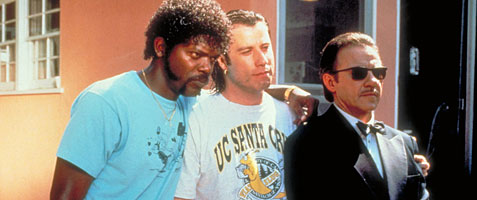
There are many career-defining performances in "Pulp Fiction," along with a couple of career-ending ones. Travolta enjoyed -- then thoroughly wasted -- a staggering career renaissance upon "Pulp's" release. He was able to flaunt his most memorable talents (his dancing chops) without the pressure of carrying the movie (that was Jackson's job, Supporting Actor Oscar nomination be damned). Rhames is hilarious as the soft-spoken but ruthless Marcellus; his line about getting "medieval" on the ass of someone who wronged him was the movie quote that the AFI let slip away when compiling their recent list. Harvey Keitel and Christopher Walken also provide invaluable support in near-cameo roles.
And then there's Samuel L. Jackson. It must have killed him to know that he didn't have a chance in hell of winning the Oscar for Supporting Actor (it wasall but given to Martin Landau, whose performance in "Ed Wood" was perfectly fine but ultimately forgettable), because this is without a doubt the best role he will ever play in his life. A man equally comfortable with a Bible verse and the 'F' bomb, Jules is the movie's soul, a hitman who possesses, if not a conscience, a profound grasp of karma.
If anyone suffers in the movie, it's the women. Sure, Butch's girlfriend Fabienne (Maria de Medeiros) has her funny little soliloquy about Madonna's potbelly, but is mostly remembered as the dummy who left Butch's watch behind at his apartment after he stiffed Marcellus and flew the coop (suffice it to say the watch has enormous sentimental value). Rosanna Arquette fares even worse, playing Eric Stoltz' shrieking harpy of a wife with an impossible number of earrings all over her face and body.
The women issues aside, "Pulp Fiction" is easily one of the best movies, if not the best movie, of the '90s. Tarantino himself knew what a tough task he faced in following it up when he joked that he was "gonna pull a Terrence Malick" and for 20 years. He was only out of the director's chair for three years (though ubiquitous in every other aspect during the time in between), but "Pulp's" eventual follow-up, "Jackie Brown," seemed like a concerted effort on Tarantino's part to lower everyone's expectations of him. If that sounds selfish, it's because it is, but in retrospect, it was the smarter play than pulling a James Cameron, who begged for respect with each project and then ran for the hills when he finally got it. "Pulp Fiction" is the kind of moment that doesn't strike twice: a brash, smart, wildly entertaining movie that will be oft imitated but never duplicated.
Single-Disc Blu-ray Review:
"Pulp Fiction" finally gets the Blu-ray treatment thanks to Lionsgate, and it's every bit as good as the movie deserves, with a director-approved high definition transfer that looks amazing, a 5.1 DTS-HD Lossless Audio track, and two brand new special features: a 43-minute retrospective titled “Not the Usual Boring Getting to Know You Chit Chat” that includes interviews from several key cast members about making the movie, and a film critic roundtable (“Here Are Some Facts on the Fiction”) moderated by Elvis Mitchell. Additionally, all of the bonus material from the previous release has been included, like the making-of documentary "Pulp Fiction: The Facts," the entire "Charlie Rose Show" interview with Tarantino, a production design featurette, behind-the-scenes montages, deleted scenes, "Siskel & Ebert: At The Movies – The Tarantino Generation," Tarantino’s Palm d'Or acceptance speech at the Cannes Film Festival, and much more.
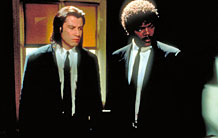 |
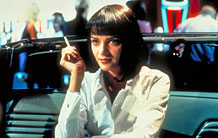 |
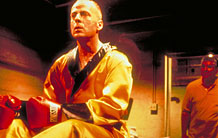 |
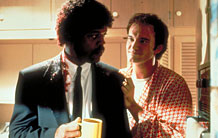 |
You can follow us on Twitter and Facebook for content updates. Also, sign up for our email list for weekly updates and check us out on Google+ as well.












